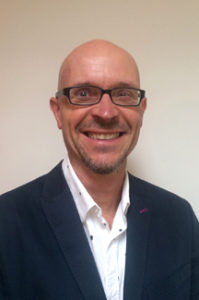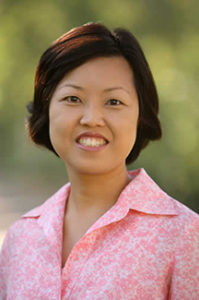- 01. What was the Foundry and who were its leaders?
- 02. What did it look like in practice?
- 03. How did you describe the program to potential participants?
- 04. 5. You mentioned a “lectionary,” would you provide the suggested reading list and an overview of the suggested experiences?
- 05. When did it run and was it repeated?
- 06. How did it go and what did we learn?
01. What was the Foundry and who were its leaders?
The Foundry was the fruit of the Renovare Institute (RI) and its two-year program on spiritual formation. I, Jim Wright, and the woman with whom I am married, Heather Keaney, were part of the Santa Barbara cohort, 2012 – 2014. The third principal leader was Helen Rhee, a professor of church history and a friend and colleague of ours. All three of us were powerfully motivated to offer opportunities for spiritual formation to those in our local church.
We chose the name, The Foundry, both as a homage to our church’s Wesleyan roots (this was the name of the first London church established by John Wesley) and to indicate a place where things are formed.
02. What did it look like in practice?
- The Foundry was not a church service, strictly speaking, but a community of people who committed to attend, and be present with each other on the journey, rather than just dropping in on occasion.
- The expected level of commitment for anyone wishing to join The Foundry was to meet twice each month on Sunday evenings all together and twice each month in small home groups.
- The time expectations were pitched at a level that should be manageable for a person with a normal level of work and family commitments, but who is serious about wanting to grow as a Christian and to live a rounded and intentional life.
- Each month we focused on a single discipline. For a list of the disciplines we chose, and for the lectionary readings (see below), see the attached program.
- The Sunday evening meetings had elements of liturgy, worship, prayer and teaching. The teaching each month was a discussion-based Biblical exposition around a spiritual discipline.
- In the home groups members discussed experiences, triumphs and failures in praxis of the discipline of that month.
- There was a ‘lectionary’ of readings that were common to all members – calculated to be approximately 10 minutes or so per day. These formed the basis for discussion in home groups. Again, the readings for each month focused on the chosen discipline of that month. However, the groups were not only about discussion and understanding, but emphasized and encouraged appropriate practice of whatever was read.
- Each member of the Foundry was encouraged to develop a personal plan for living intentionally (a regula vitae or ‘rule of life’) – which included a coherent and holistic approach to work, family, neighborhood and the wider world.
- The small groups acted to provide gentle encouragement and accountability for the understanding and practice of the spiritual disciplines.
After 12 months, members of the group were expected to use what they had learned for the benefit of the local church and the wider community. They would therefore leave The Foundry.
03. How did you describe the program to potential participants?
Our goal is that Sunday teaching, small group discussions, journaling, reading, practice of the disciplines and thoughtful intentionality about engaging with the world around us, will cohere to permit the Spirit to blow where he will. To this end, we will not assign a heavy reading schedule but will seek to provide a couple of reasonably accessible readings for each small group meeting, around a monthly discipline. The intention is that this should constitute approximately 10 minutes per day for a college grad with a normal reading speed.
04. 5. You mentioned a “lectionary,” would you provide the suggested reading list and an overview of the suggested experiences?
Primary suggested reading:
- Celebration of Discipline by Richard Foster, 3rd HarperOne;
- Reconciling All Things by Emmanuel Katongole and Chris Rice, IVP 2008
- Present over Perfect by Shauna Niequist, Zondervan, 2016
Monthly Flow:
Month 1:
What does a healthy Christian narrative look like, and how do we make sure we have it?
- Good and Beautiful God – James Bryan Smith – Ch 1 and soul training – sleep
- Present over Perfect – pp 15 – 28, 127 – 131, 199 – 203, 220 – 234
Months 2 & 3:
What are the spiritual disciplines, and what are they not?
- The Divine Conspiracy – Willard – pp 353 – 373
- COD – Ch 1
- Present over Perfect – pp 39 – 42, 186 -188
How do we simultaneously make the inward journey and the outward journey, in ways that are healthy, life giving and Christ-like?
- Living Without Enemies – Sam Wells and Marcia Owen – extract
- Mirror to the Church – Emmanuel Katongole – Ch. 5 – postures of social engagement
- Reconciling All Things – Emmanuel Katongole and Chris Rice – all, but see discipline for August
Months 4 to 10: The Spiritual Disciplines
Month 4:
Fasting (March/April – Lent begins March 1)
- Celebration of Discipline (“COD”) – Ch 4
- Mud house Sabbath – Lauren Winner – intro and Ch 7
Month 5:
Prayer
- Prayer – Finding the Heart’s True Home – Richard Foster – intro and Ch 1
- COD, Ch 3 – Prayer
- Wisdom Distilled from the Daily – Joan Chittister – chapter 3
- Present over Perfect – pp 74 – 78, 88 – 9,
Month 6: Solitude and silence
- The Fire of the Word – Chris Webb – Ch 8
- COD, Ch 7
- Extract from Henri Nouwen – Devotional Classics
- Present over Perfect – pp 84 – 87, 92 – 93,
Month 7: Simplicity and Generosity
- Good and Beautiful Community – Ch 7 – Generosity.
- The Spirit of the Disciplines – Dallas Willard- chapter 10
- COD – Ch 6 – Simplicity
- Devotional Classics- Elizabeth O’Connor
- Sermons – John Wesley
- Present over Perfect – pp180 – 185
Month 8: Connection with the world outside ourselves
- Reconciling All Things – Emmanuel Katongole and Chris Rice – all
Month 9: Sabbath
- Playing God – Andy Crouch – Ch 13
- The Sabbath Experiment: Spiritual Formation by Living in a Non-Stop World – Rob Muthiah – pp 13 – 28
Month 10: Confession/failure
- The Return of the Prodigal Son – Henri Nouwen – Ch. 3
- Falling Upward – Richard Rohr – Ch. 5
- Let Your Life Speak – Parker J. Palmer – Ch. 4
Month 11 Gratitude
- A Thousand Gifts – Anne Voscamp – extract
- Reverence – Barbara Brown Taylor – article
- Present over Perfect – pp 165 -168
Month 12: Gathering our thoughts, and next steps (December)
05. When did it run and was it repeated?
We ran The Foundry twice , in 2015/16 and again in 2017.
06. How did it go and what did we learn?
- We found it relatively easy to attract people—there is an interest in, and desire for, spiritual formation. We have typically around 350 people at our church on Sundays, and we had 50 sign up for the 16-month iteration and 32 for the 11-month running.
- The first iteration was very inward focused—it was centrifugal, if you will. We corrected for the second iteration in trying (to some extent) to locate spiritual formation and the disciplines within a more centripetal energy – formation and disciplines as drivers to real world engagement.
- The issue of commitment is central to such a project. Despite telling everyone who was interested in signing up that we expected a good faith commitment to attend at least 75% of the meetings, and getting their agreement to this, probably only half the people who completed either iteration achieved that. We also had some people drop out mid-stream, in some cases for natural life events and for a few because it was not a good fit.
- A key dimension is the choice of leaders for the small groups. I think we had better results when we matched a senior leader possessing a true commitment to spiritual disciplines, with a younger leader who was teachable and had more discretionary time, than when we chose people with general leadership and life experience but who were not necessarily passionate about the disciplines.
- Some lasting relationships originated in the two communities birthed by The Foundry, but I don’t have data on how lasting were any changes in individual praxis or perception as a result of The Foundry.

Jim Wright received his law degree from Cambridge University and established one of the largest international law practices in Cairo. He is an adjunct professor at Westmont College, a husband to Heather, and a slowly recovering Enneagram 3.

Heather Keaney, Ph.D., is an associate professor of Middle East history at Westmont College and an alumnai of Westmont, UCSB, and Renovare.

Helen Rhee, Ph.D., is a professor of the history of Christianity at Westmont College. She specializes in early Christian literature and theology. She has served as a pastor for many years.